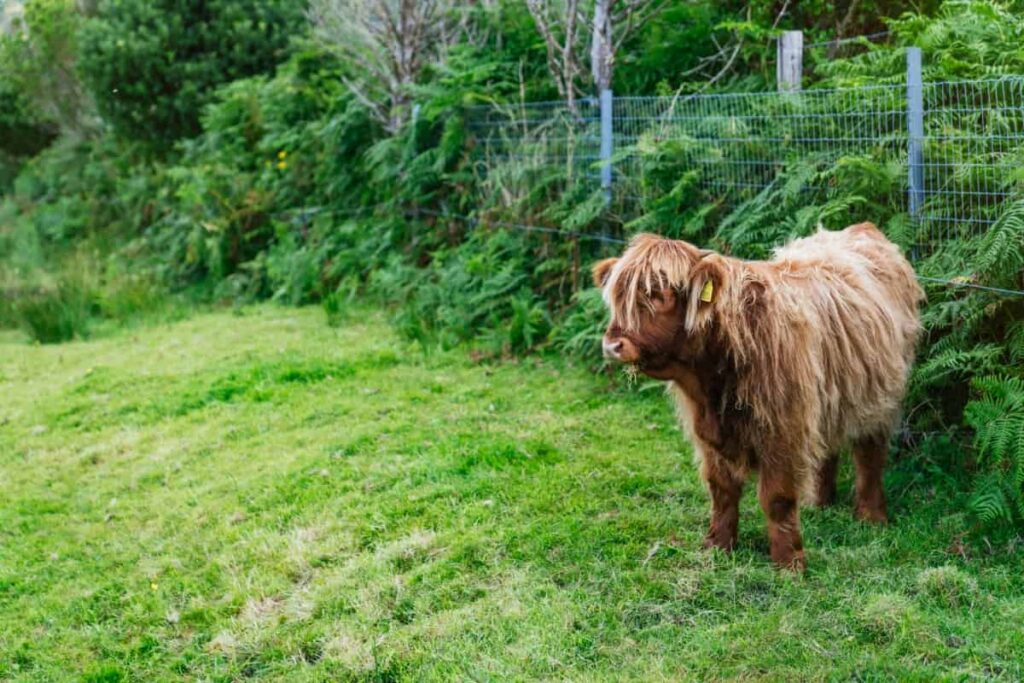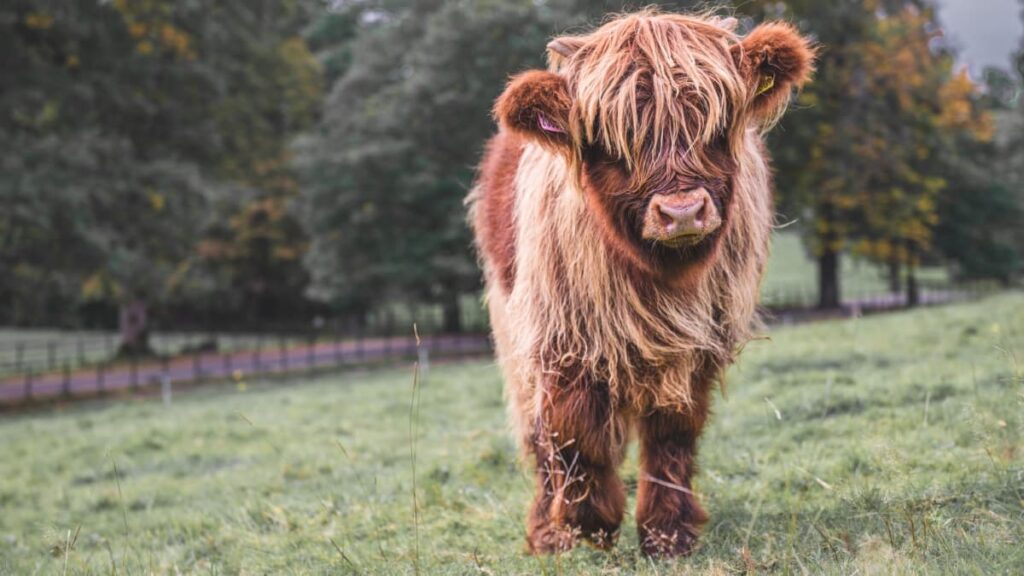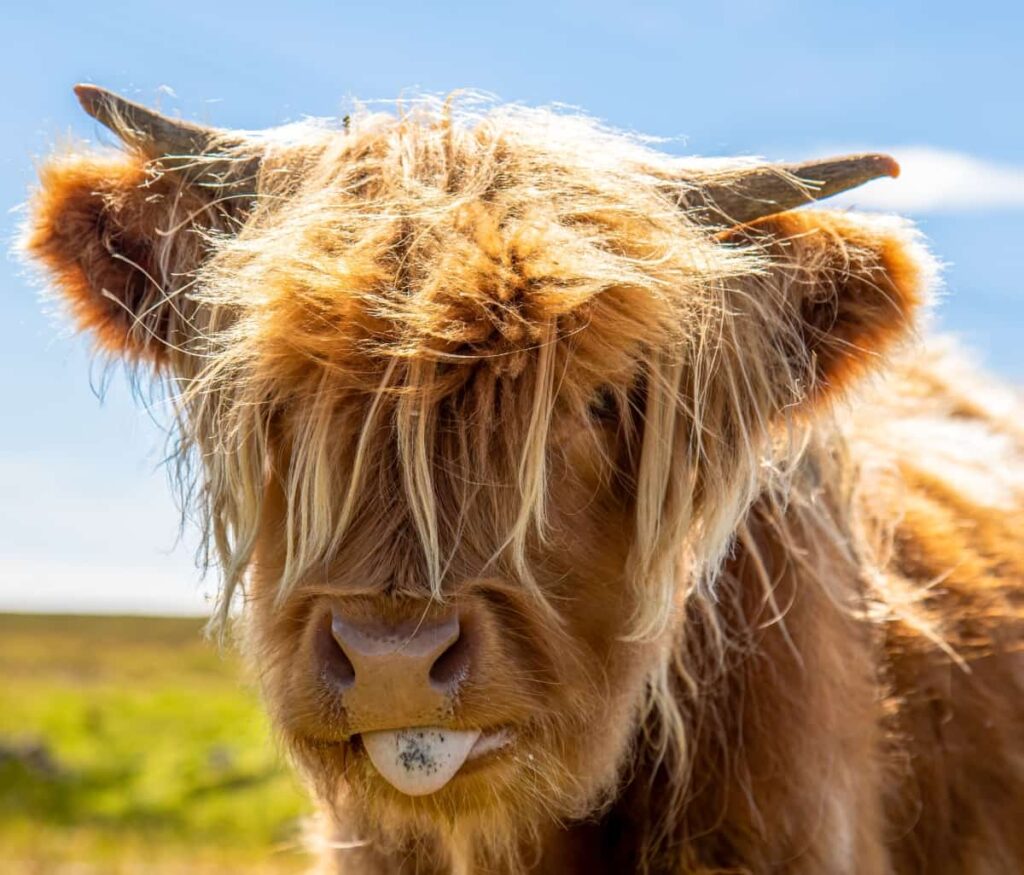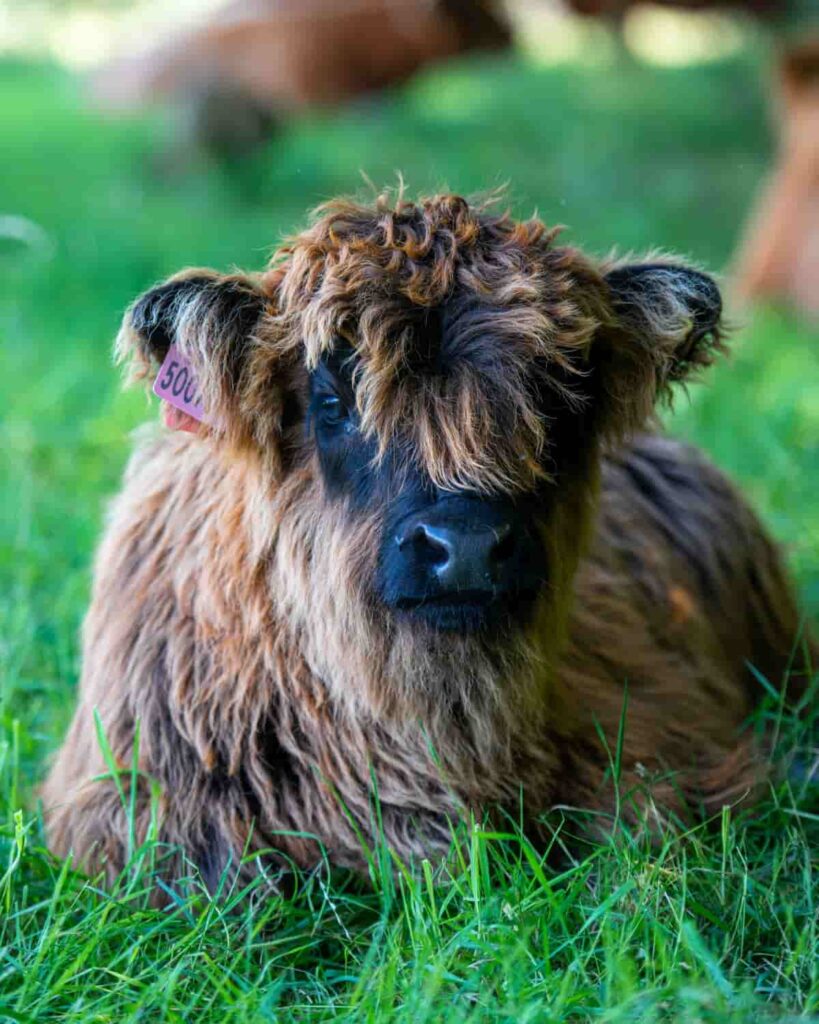Mini Highland Cows hail from the Highlands of Scotland, which means they are well-adapted to cold weather climates and lush pasturelands. So, if you live in an area with harsh winters or abundant greenery, Mini Highland cows could be a perfect fit for your farm or homestead. Mini Highland cows make fantastic pets. They’re not only cute but also friendly and easy to handle.
In terms of appearance, Mini Highland cows come in a variety of colors, including red, black, brown, yellow, white, or silver. This soft and furry coat not only keeps them warm during cold weather but also adds to their appeal as pets or show animals. Another standout characteristic of Mini Highland cows is their gentle and friendly nature.

How to Raise Mini Highland Cows
Facts About Mini Highland Cows
| Breed Name | Mini Highland Cows |
| Origin | Highlands of Scotland |
| Uses | Mow your lawn, pets, and show animals in exhibitions |
| Height | 36 to 42 inches |
| Behavior | Very docile animal |
| Weight | Between 500 and 600 pounds |
| Where to buy | Online, nearby local farm websites, or cattle societies |
| Cost | Roughly $1,800 to $3,500 |
| Life span | 12 to 15 years |
Preparing for Your Mini Highland Cow
Selecting a Suitable Environment
Firstly, you’ll need to ensure that your Mini Highland Cow has enough space to roam around. Next, consider the type of terrain in your chosen location. Mini Highland Cows are well-suited for hilly or rocky areas due to their sturdy build and sure-footedness. Mini Highland Cows are known for their ability to withstand harsh climates.
Essential Supplies and Equipment
Some essential supplies are fencing, water troughs, feeding equipment, grooming tools, and handling facilities. A sturdy fence is crucial to keep your Mini Highland Cows safe and secure. Invest in large, durable water troughs that can accommodate their size and allow easy access. Consider using hay racks or feeders designed for cattle to prevent wastage and ensure proper nutrition. Keeping your cows’ coats healthy and clean requires grooming tools such as brushes and combs specifically made for cattle breeds.
Nutrition and Feeding
Understanding the Dietary Needs of Mini Highland Cows
Mini Highland cows are herbivores, meaning their diet consists primarily of grass, hay, and other plant materials. It’s essential to monitor the body condition of your Mini Highland cow regularly and adjust their feed accordingly.
Tips for Healthy Feeding Routines
It’s crucial to prioritize the quality of the feed rather than just focusing on the quantity. Mini Highland cows have smaller stomachs compared to other breeds, so it’s important not to overload them with food at once. Ensure that fresh, clean water is always available for your Mini Highland cow. Contact a veterinarian or livestock nutritionist to determine the specific nutritional needs of your Mini Highland cow based on factors such as age, weight, and activity level.
Housing and Shelter
Designing Comfortable Living Spaces
When designing their living spaces, consider the size of your mini highland cow herd. Each cow requires ample space to move around freely and engage in natural behaviors. Ensure that the shelter provides adequate protection from extreme weather conditions. Remember that cleanliness is essential in maintaining a healthy living space for your mini highland cows.
Shelter Requirements for Different Weather Conditions
In colder regions, where temperatures can drop significantly, it’s important to provide adequate protection from harsh elements. A sturdy and insulated shelter will keep your Mini Highland cow warm and dry during winter months. During hotter seasons, ample shade becomes a priority. Trees or other forms of natural shade should be available in the pasture area to protect these cows from excessive sun exposure.
In case you missed it: 50 Cow Dairy Farming Project Report: Profits, Setup Cost, and Bank Loan in India

Health and Veterinary Care
Routine Health Check-ups
The important aspect of routine health check-ups is vaccinations. Vaccinations help protect your Mini Highland cow from common diseases and infections. Your vet will recommend a vaccination based on your location and specific needs. In addition to vaccinations, parasite prevention is another vital component of routine care. Regular dental care is also crucial for maintaining proper oral hygiene in Mini Highland cows. Dental exams can identify any dental issues or abnormalities that may require treatment.
Common Health Issues and Prevention
Some common health issues that Mini Highland Cows may face are respiratory problems, parasites, metabolic disorders, and foot problems. Vaccinations play a major role in preventing diseases in these gentle giants. Make sure they receive regular vaccinations against common bovine illnesses such as brucellosis and leptospirosis.
Handling and Training
Building Trust with Your Mini Highland Cow
When handling your Mini Highland cow, always approach them calmly and speak in soothing tones. Avoid loud noises that may startle them. Take the time to get to know their personality and preferences. Training sessions should be short but consistent, focusing on positive reinforcement methods. Regular interaction is key to building trust with your Mini Highland cow.
Basic Training and Handling Techniques
Start by building trust with your Mini Highland cow. Spend time bonding with them, offering treats, and speaking to them in a calm, soothing voice. This will help establish a positive relationship between you and your cow. Next, introduce basic commands such as “walk” or “stop.” Use these commands consistently during daily interactions to reinforce the desired behaviors. Start in small enclosed areas before gradually introducing new environments.
Breeding and Reproduction
Understanding the Breeding Cycle
These gentle creatures typically reach maturity between 12 to 18 months, but it’s important to wait until they are physically mature before breeding them. This usually occurs around 2 years of age. When it comes to reproduction, timing is everything. Once successfully bred, the gestation period for Mini Highland cows is roughly nine months, similar to other cattle breeds.
Caring for Pregnant Cows and Calves
Providing proper nutrition is crucial during this time. Pregnant cows have increased nutritional requirements, so be sure to provide them with a well-balanced diet that includes plenty of high-quality hay or pasture. Monitoring the health of your pregnant cow is also essential. Providing a safe and comfortable environment for calving is equally important.
Grooming and Maintenance
Coat Care and Grooming Tips
To start with, brushing is a key grooming activity for Mini Highland Cows. Their thick coats can easily become tangled or matted if not properly cared for. These cows have naturally oily skin that helps protect them from cold weather conditions. These adorable creatures have long, shaggy hair that requires regular attention to keep it clean.
Hoof Care and Maintenance
When it comes to hoof care, regular trimming is important for the overall health of your Mini Highland Cow. Overgrown hooves can lead to discomfort and even lameness in extreme cases. Consult with a professional hoof trimmer who specializes in cattle care to ensure proper maintenance.
In case you missed it: Sustainable Solutions of Cow Dung Manure: Production Process, Exploring the Benefits and Applications

Legal and Ethical Considerations
Understanding Local Livestock Laws
These laws are designed to ensure the safety of animals, as well as protect the interests of both farmers and consumers. The important aspect of local livestock laws is zoning restrictions. It’s essential to familiarize yourself with these guidelines before setting up your mini herd. Another consideration is permits and licensing. Depending on where you live, there may be certain licenses or permits required for owning cattle.
Ethical Practices in Raising Mini Highland Cows
The crucial aspect of ethical practices is providing proper care for your Mini Highland Cows throughout their lives. Additionally, it is important to treat these gentle creatures with kindness and respect. Being aware of local livestock laws is crucial for adhering to regulations regarding animal husbandry. Stay informed about zoning restrictions or permitting requirements that may apply when raising Mini Highland Cows.
In case you missed it: HF Cow Facts (Holstein Friesian), Profile

Conclusion
These adorable creatures make wonderful pets and have some unique characteristics that set them apart from other cattle breeds. Raising Mini Highland Cows is important because they bring joy as loving pets while offering numerous practical advantages such as resilience against harsh weather conditions and suitability for smaller living spaces.
- Profitable Village Farming Business Ideas in 2024
- High-Yield Aquaculture: Fast-Growing Fish for Farming
- Effective Fish Pond Construction Techniques for Beginners
- Irrigation and Water Management in Pineapple Farming
- Blossom to Harvest: Mastering Flowering and Pollination in Papaya Farming
- Pig Fattening Essentials: From Selection to Sale for Beginners
- Raising Wagyu Cattle: A Complete Guide for Premium Beef Production
- Soil Types and Their Water Holding Capacity
- Optimizing Irrigation Schedules for Coconut Groves for Enhanced Yield
